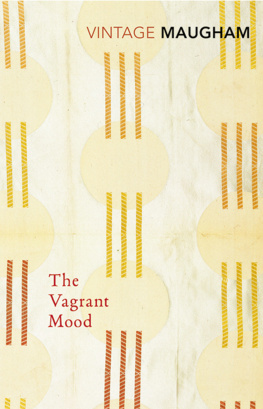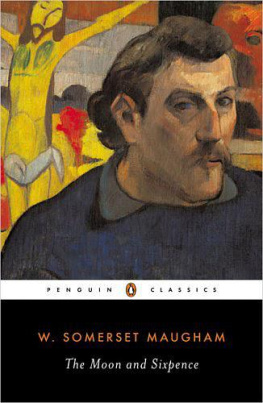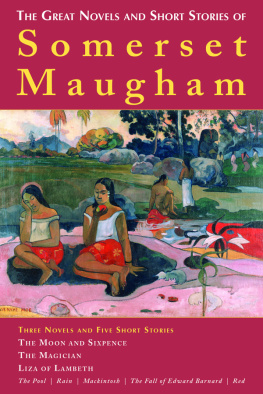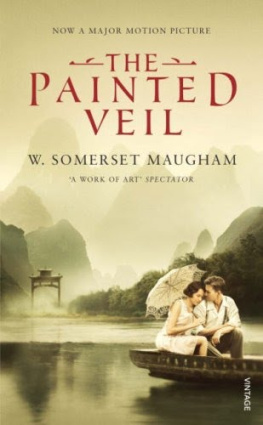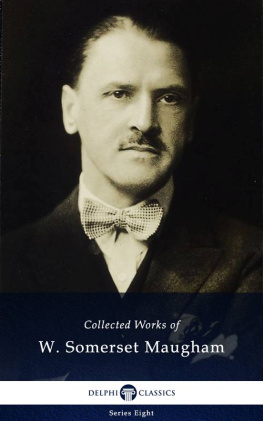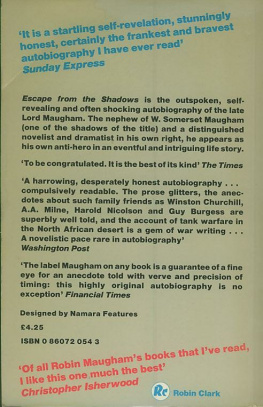W. Somerset Maugham - The Vagrant Mood
Here you can read online W. Somerset Maugham - The Vagrant Mood full text of the book (entire story) in english for free. Download pdf and epub, get meaning, cover and reviews about this ebook. year: 2011, publisher: Vintage Digital, genre: Detective and thriller. Description of the work, (preface) as well as reviews are available. Best literature library LitArk.com created for fans of good reading and offers a wide selection of genres:
Romance novel
Science fiction
Adventure
Detective
Science
History
Home and family
Prose
Art
Politics
Computer
Non-fiction
Religion
Business
Children
Humor
Choose a favorite category and find really read worthwhile books. Enjoy immersion in the world of imagination, feel the emotions of the characters or learn something new for yourself, make an fascinating discovery.
- Book:The Vagrant Mood
- Author:
- Publisher:Vintage Digital
- Genre:
- Year:2011
- Rating:4 / 5
- Favourites:Add to favourites
- Your mark:
- 80
- 1
- 2
- 3
- 4
- 5
The Vagrant Mood: summary, description and annotation
We offer to read an annotation, description, summary or preface (depends on what the author of the book "The Vagrant Mood" wrote himself). If you haven't found the necessary information about the book — write in the comments, we will try to find it.
The Vagrant Mood — read online for free the complete book (whole text) full work
Below is the text of the book, divided by pages. System saving the place of the last page read, allows you to conveniently read the book "The Vagrant Mood" online for free, without having to search again every time where you left off. Put a bookmark, and you can go to the page where you finished reading at any time.
Font size:
Interval:
Bookmark:

The Vagrant Mood is a brilliantly varied and colourful collection of essays. From Kant to Raymond Chandler; from the legend of Zurbaran to the art of the detective story; from Burke to Augustus Hare, Somerset Maugham brings his inimitable mastery of the incisive character sketch to the genre of literary criticism.
William Somerset Maugham was born in 1874 and lived in Paris until he was ten. He was educated at Kings School, Canterbury, and at Heidelberg University. He spent some time at St. Thomas Hospital with the idea of practising medicine, but the success of his first novel, Liza of Lambeth, published in 1897, won him over to letters. Of Human Bondage, the first of his masterpieces, came out in 1915, and with the publication in 1919 of The Moon and Sixpence his reputation as a novelist was established. At the same time his fame as a successful playwright and short story writer was being consolidated with acclaimed productions of various plays and the publication of The Trembling of a Leaf, subtitled Little Stories of the South Sea Islands, in 1921, which was followed by seven more collections. His other works include travel books, essays, criticism and the autobiographical The Summing Up and A Writers Notebook.
In 1927 Somerset Maugham settled in the South of France and lived there until his death in 1965.
OTHER WORKS BY W. SOMERSET MAUGHAM
Novels
The Moon and Sixpence
Of Human Bondage
The Narrow Corner
The Razors Edge
Cakes and Ale
The Merry-Go-Round
The Painted Veil
Catalina
Up at the Villa
Mrs Craddock
Christmas Holiday
The Magician
Theatre
Liza of Lambeth
Then and Now
Collected Short Stories
Collected Short Stories Vol. 1
Collected Short Stories Vol. 2
Collected Short Stories Vol. 3
Collected Short Stories Vol. 4
Short Stories
Ashenden
Far Eastern Tales
More Far Eastern Tales
Travel Writing
The Gentleman in the Parlour
On a Chinese Screen
Don Fernando
Literary Criticism
Ten Novels and their Authors
Points of View
Autobiography
A Writers Notebook
The Summing Up
W. SOMERSET MAUGHAM

This ebook is copyright material and must not be copied, reproduced, transferred, distributed, leased, licensed or publicly performed or used in any way except as specifically permitted in writing by the publishers, as allowed under the terms and conditions under which it was purchased or as strictly permitted by applicable copyright law. Any unauthorised distribution or use of this text may be a direct infringement of the authors and publishers rights and those responsible may be liable in law accordingly.
Version 1.0
Epub ISBN 9781407074740
www.randomhouse.co.uk
Published by Vintage 2001
2 4 6 8 10 9 7 5 3
Copyright The Royal Literary Fund
W. Somerset Maugham has asserted his right under the Copyright, Designs and Patents Act 1988 to be identified as the author of this work

First published in Great Britain by William Heinemann in 1952
Vintage
Random House, 20 Vauxhall Bridge Road,
London SW1V 2SA
www.vintage-classics.info
Addresses for companies within The Random House Group Limited can be found at: www.randomhouse.co.uk/offices.htm
The Random House Group Limited Reg. No. 954009
A CIP catalogue record for this book is available from the British Library
Three of the essays in this volume appeared in The Cornhill. One was delivered as a lecture at the Philosophical Colloquium of the University of Columbia, but I have rewritten it in the hope of making it more easily readable. Part of the final essay appeared many years ago in Life and Letters.
W. S. M.
I think I must be one of the few persons still alive who knew Augustus Hare. I had published a first novel which had had some success and he asked a common friend, a minor canon of St. Pauls, to invite me to dinner so that we might meet. I was young, twenty-four, and shy; but he took a fancy to me, because, tongue-tied though I was, I was content to listen while he discoursed, and shortly afterwards he wrote to me from Holmhurst, his house in the country, and asked me to come down for the week-end. I became a frequent guest.
Since the kind of life he lived there is lived no longer, I think it may be not without interest to describe the daily round. Sharp at eight in the morning a maid in a rustling print dress and a cap with streamers came into your room with a cup of tea and two slices of thin bread and butter, which she placed on the night table; if it was winter a tweeny followed her, in a print dress too, but not so shiny nor so rustling, who raked out the ashes of the fire which had been lit the night before, and laid and lit another. At half-past eight the maid came in again with a small can of hot water. She emptied the basin in which you had made a pretence of washing before going to bed, put the can in the basin and covered it with a towel. While she was thus occupied the tweeny brought in a sitz-bath, laid a white mat so that water should not splash the carpet, and on it, in front of the blazing fire, placed the sitz-bath. On each side of this she set a large can of hot water and a large can of cold, the soap-dish from the washing-stand and a bath-towel. The maids retired. The sitz-bath must be unknown to the present generation. It was a round tub perhaps three feet in diameter, about eighteen inches deep, with a back that rose to your shoulder-blades when you were sitting in it. Outside it was japanned a bilious yellow and inside painted white. As there was no room for your legs, they dangled outside, and you had to be something of a contortionist to wash your feet. You could do nothing about your back but trickle water down it from your sponge. The advantage of the contraption was that as your legs and back were out of the water you had no occasion to dawdle as you do in a bath in which you can lie full length, so that though you lost the happy thoughts and fruitful reflections which you might otherwise have had, you were ready to go downstairs at nine oclock when the breakfast bell rang.
Augustus was already in his chair at the head of the table, laid for the hearty meal he was soon to partake of. In front of him was the great family Bible and a large Prayer Book bound in black leather. Seated, he looked solemn and even imposing. Standing, however, because he had a long body and short legs, he lost something of his impressiveness and indeed looked a trifle ridiculous. The guests took their seats and the servants trooped in. A row of chairs had been placed for them in front of the sideboard, on which, besides a noble ham and a brace of cold pheasants, various good things to eat were kept hot in silver entre dishes by the thin blue flames of methylated spirit. Augustus read a prayer. He had a strident, somewhat metallic voice and he read in a tone that seemed to suggest that he was not one to stand any nonsense from the deity. Sometimes it happened that a guest was a minute or two late; he opened the door very cautiously and slunk in on tiptoe, with the air of one who seeks to make himself invisible. Augustus did not look up; he paused in the middle of a sentence and remained silent till the late-comer had seated himself, and then proceeded from where he had left off. The air was heavy with reproof. But that was all: Augustus made no reference afterwards to the sluggards tardiness. When he had read a certain number of prayers Augustus closed the book and opened the Bible. He read the passages marked for the day, and having finished, uttered the words: Let us pray. This was the signal for us all to kneel, the guests on hassocks and the servants on the Turkey carpet, and we recited in chorus the Lords Prayer. Then we scrambled to our feet, the cook and the maids scuttled out of the room; in a moment the parlour-maid brought in tea and coffee, removed Bible and Prayer Book, and put the tea-kettle and coffee-pot in their place.
Font size:
Interval:
Bookmark:
Similar books «The Vagrant Mood»
Look at similar books to The Vagrant Mood. We have selected literature similar in name and meaning in the hope of providing readers with more options to find new, interesting, not yet read works.
Discussion, reviews of the book The Vagrant Mood and just readers' own opinions. Leave your comments, write what you think about the work, its meaning or the main characters. Specify what exactly you liked and what you didn't like, and why you think so.

